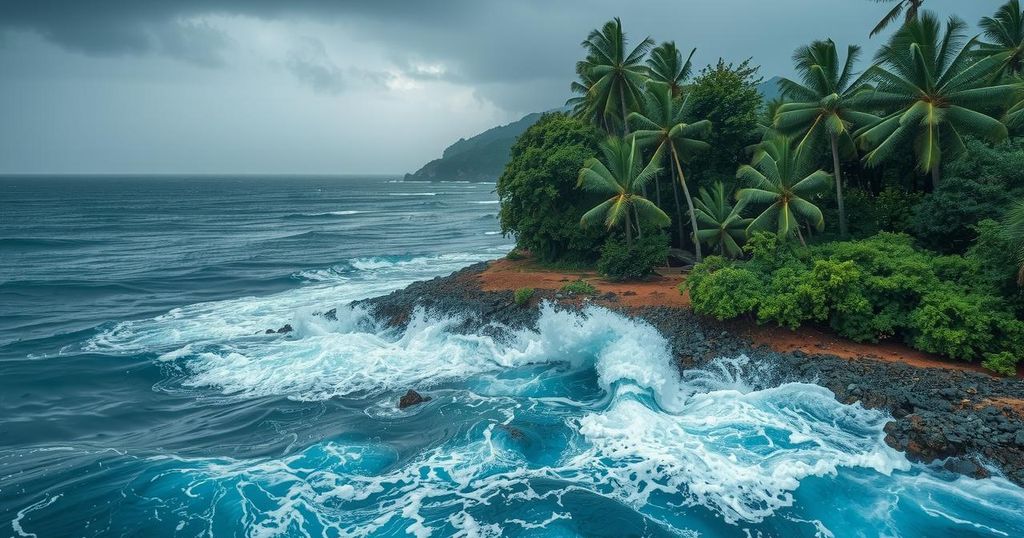Tropical Storm Dikeledi Wreaks Havoc in Mozambique Following Tragedy in Madagascar
Tropical Storm Dikeledi impacted northern Mozambique after causing casualties in Madagascar. The storm brought severe winds and heavy rains, prompting flood warnings and safety advisories from officials. Citizens are urged to seek shelter as the storm continues moving south, with concerns raised about increased cyclone intensity tied to climate change. Historical data shows Mozambique’s susceptibility to cyclones, resulting in significant damage and loss of life in previous events.
Tropical Storm Dikeledi made landfall in northern Mozambique on Monday, resulting in significant devastation. Prior to reaching Mozambique, the storm had already claimed the lives of at least three individuals in Madagascar and caused severe flooding in the French territory of Mayotte. As Dikeledi intensified while entering Mozambique’s coastal Nampula region, it brought with it destructive winds and heavy rainfall, as reported by the French weather agency Meteo-France.
In the wake of previous cyclones, the potential for flooding remains a serious concern, prompting Mozambique’s National Institute of Meteorology (INAM) to issue alerts forecasting rainfall totals of up to 200 millimeters (approximately eight inches) within a 24-hour period, alongside wind gusts approaching 180 kilometers (110 miles) per hour. In light of this natural disaster, President Filipe Nyusi has urged residents in affected areas to take essential precautions, such as seeking safe shelter and ensuring adequate supplies of food and water.
Dikeledi’s trajectory indicates it could similarly impact other regions, having already inflicted damage on Madagascar over the weekend, where it initially struck as a cyclone, producing severe winds and rainfall. The National Office for Risk and Disaster Management documented three fatalities in Madagascar due to the storm. Furthermore, there are warnings from Meteo-France regarding the possibility of Dikeledi striking Madagascar’s southwest coast as it continues its southward movement.
Cyclones frequently develop in the Indian Ocean between November and March, with this year witnessing surface water temperatures nearing 30 degrees Celsius (86 degrees Fahrenheit), a condition known to amplify storm activity, reflective of broader global warming trends observed in similar oceanic regions.
Tropical storms and cyclones are common occurrences in the Indian Ocean, particularly during the cyclone season, which spans from November to March. These storms often lead to devastating impacts, including loss of life, severe flooding, and substantial property damage. Climate change has contributed to increased storm intensity owing to rising sea surface temperatures, prompting concerns about the frequency and severity of such weather events. Mozambique has a history of recurrent cyclones, which have previously resulted in significant casualties and infrastructure damage, underscoring its vulnerability to climate-related disasters.
In summary, Tropical Storm Dikeledi poses a considerable threat to northern Mozambique following its impact in Madagascar and Mayotte. The storm’s intensification, coupled with precautionary measures from authorities and the potential for significant flooding, highlights the need for preparedness among affected communities. The cyclical nature of storms and the influence of climate change exemplify the ongoing challenges faced by this region in mitigating the impacts of severe weather events.
Original Source: www.barrons.com




Post Comment